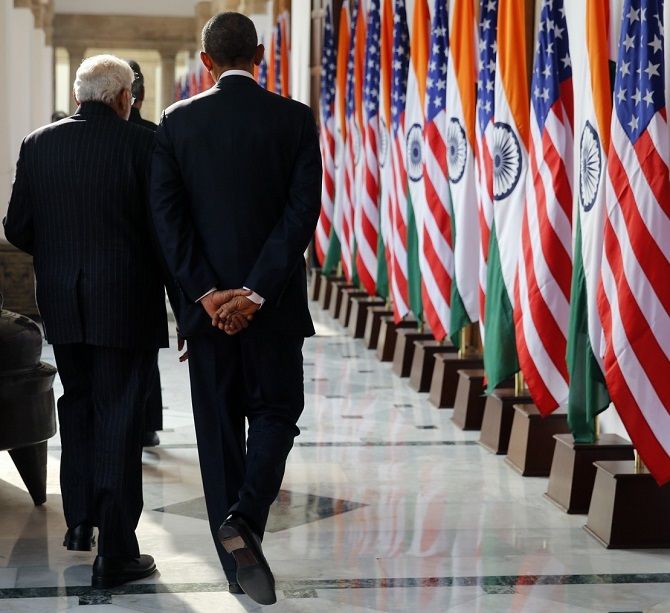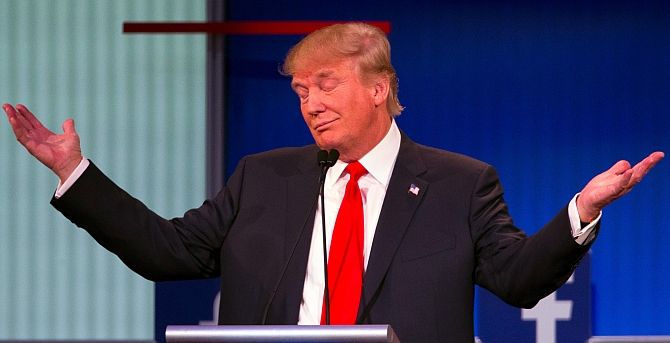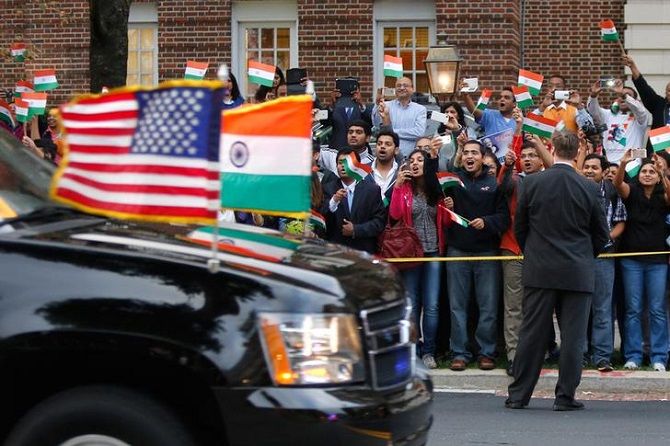Aziz Haniffa, who has covered every Indian prime minister's visit to the US since Rajiv Gandhi in 1985, gives us a peek into what's happening in Washington, DC on the eve of Modi's meeting with Trump.

Journalist Aziz Haniffa began covering State visits by Indian prime ministers in the United States when India was perceived as a surrogate of the erstwhile Soviet Union in Washington, DC and was regularly pilloried in the US Congress.
And he had a ringside view when the first seeds of change were sowed.
"It began with Rajiv Gandhi in 1985 when he came for a State visit at the invitation of Ronald Reagan," Haniffa says.
"This was still the Cold War, but the vibes were amazing. They both got along really well; in fact, at the time there were even talks that it was like a 'father-son relationship', etc."
"A lot of people talk about the US-India science and technology collaborations and technology transfers starting in the Clinton years," Haniffa adds, "but it was really during the Gandhi-Reagan meeting that all this was mooted."
Since then, Haniffa -- executive editor, India Abroad, the oldest Indian-American newspaper and widely considered the dean of the Indian-American media -- has covered every Indian prime minister's visit to the US and witnessed the incredible maturing of the US-India relationship.
This time, he believes, the focus will be on reinforcing the continuity of the relationship without any of the excitement that we have come to expect from such summits.
Haniffa spoke to Rediff.com's Monali Sarkar on the eve of Modi's arrival in the US for his first meeting with President Donald Trump.
US-India ties have seen disastrous summits like the Richard Nixon-Indira Gandhi and Jimmy Carter-Morarji Desai ones and lacklustre ones like the Bill Clinton-I K Gujral one.
But since President Clinton's India visit in 2000, we have gotten used to a certain hype, a certain excitement.>
The Trump-Modi summit, however, is marked by a lack of excitement and expectations. What kind of impact does having low expectations of such a summit have?
I think with all the domestic troubles that Trump was having, his troubles with allies like NATO, and the fact that he attacked India on the climate change issue, the bar was set pretty low.
It seemed like they wanted to go through the motions, because waiting for Trump and Modi to meet at the G20 Summit (already scheduled for July) would not exactly qualify as a bilateral summit. And you want to have some continuity.
But amazingly, over the last few days there has been a change.
A senior White House official who briefed us (on June 23) noted that it is not like Trump doesn't know India. He was there at the Shalabh Kumar campaign rally; he has been to Bombay. And they have been briefing him about the strategic depth of the relationship.
On the defence side, the Guardian drone deal is expected to happen and the co-production of F-16s with the Tatas has already been finalised.
Now, they are talking about the fact that America First and Make in India are not mutually exclusive, but can be mutually beneficial.
Also, there is the fact that US National Security Adviser H R McMaster has been to India and met with Modi, and that Defence Secretary James Mattis has spoken of India in glowing terms about the work they are doing in Afghanistan, and India's importance in maritime security in the Asia Pacific region.
So, from the low just after Trump's climate change attack on India, I think there is a little bit more optimism, more excitement.
But this is still going to be a very business-like visit. It is not a State visit, and there won't be any pomp.
I don't think there are any expectations of moments like when Obama and Modi went to Martin Luther King's memorial etc.
They will have the usual Oval Office photo op, but it is also unlikely that there will be the usual press conference after the meeting.
A senior White House official kept saying don't read anything into it; it's just a preference that both leaders had. (To support this) the official also pointed out that Modi was the first leader for whom President Trump was hosting a working luncheon
It has been said that there is a lack of people with India experience in the administration...
What has really happened is there is still no Assistant Secretary of State for South and Central Asia. Nisha Desai Biswal has not been replaced.
You have got Lisa Curtis, who is a top-notch South Asia specialist, in the National Security Council as senior director for South and Central Asia. So, whatever foreign policy formulations are being done are being done out of NSC, out of the White House. Not out of the State Department.
You have still get the core bureaucracy in the South Asia Bureau, but in terms of high appointments and no point person for South Asia, there is a void.

Kenneth Juster's name has just been floated for the office of US ambassador to India.
If confirmed, how effective do you believe Juster will be as a successor to someone like Rich Verma?
That kind of euphoria (about Verma's term as ambassador) probably won't be repeated for a long time to come.
He was the first Indian American and there was a lot of emotion built into it. You won't have that again.
But Ken Juster has a huge track record.
People like Ashley Tellis(whose name was said to be among those considered for the post) have said he is a great choice.
Juster knows trade and commerce. He knows transfer of technology issues.
He was in fact the guy who started this whole US-India High Technology Cooperation Group, etc.
He is a great choice. He can consolidate the partnership.
Many of those in India who believed Trump's campaign stand on China, Pakistan, and Islamic nations made him a better-suited US President for India's needs are beginning to reconsider now.
Where do you think India stands with the Trump administration?
People like (Foreign Secretary) S Jaishankar, (India's NSA) Ajit Doval and (Finance Minister) Arun Jaitley came here and met some of the main players at Treasury, the Commerce Department, the NSA, etc.
I think both sides have found each other reassuring that this relationship has been a strong partnership and that we have got to solidify it.
You don't want any ebbing of the highs in terms of the commercial and strategic partnership.
And the companies are still very gung-ho about investing in India despite their qualms about IPR and reforms not moving as fast as they want.
A key issue for India is the Trump administration's stand on H-1B visas and the treatment of Indian Americans.
Do you think Modi will try to bell this particular cat?
They want to keep away from a lot of the controversial issues.
Things like the H-1B visa might be spoken about in a peripheral way, but only with the CEOs.
The White House is playing this issue down, and a lot of the lobbies (which represent Indian IT companies) also don't think anything is going to happen.
If anything is going to happen on immigration, the priority is going to be the undocumented immigrants, etc.
If you had to list the topics that stood a chance of getting tangible results at this summit -- or during the Trump years -- what would they be?
I think they are going to stress on the positives in terms of continuity -- the defence relationship, and counter-terrorism.
Probably India will be lauded for its role in Afghanistan, and there will be talk about working together on development in Afghanistan.
There has been a lot of forward movement in terms of intelligence sharing, data sharing, counter-terrorism cooperation, and the crown jewels -- the defence cooperation with the sales that are going to take place, the co-production that is going to take place.
A couple of questions were being asked (at the White House briefing on June 23) about the drone sales. Like won't Pakistan have concerns?
And they said the zero-sum game disappeared a long time ago; we have different relationships with India and Pakistan.
I can't reiterate this defence relationship enough.
It has shown exponential growth, and this is not an administration that will have any qualms in terms of selling stuff to India.
Trump is very much for the military industrial complex.
In terms of trade and commerce, whatever has been happening will continue to happen given the fact that many CEOs are meeting with Modi.
Modi knows what Trump is looking for, that his whole focus is jobs.
I think what Modi is going to talk about is making America First and Make in India work together so that there will be jobs on both sides.
I think that's going to be the thrust of the meeting.
When it comes to foreign policy I think there will still be confusion in terms of India reading the Trump administration.
Reading Trump is also tricky.
However, even though with Trump there is always the fear that he might wing it and say something (inappropriate), the fact that there are people like McMaster, Mattis, and now Curtis brings optimism.
And most importantly, the strong bipartisan support in Congress. That is an anchor that will hold the relationship in good stead.
There are, of course, a few issues like IPR reforms that the US wants India to move faster on, but on the whole there is reason to believe there will be less tension in any facet of US-India relations than there is with some of the European allies.
(In the end) there will be a joint statement where they will reinforce things like counter-terrorism, security cooperation, and trying to work together in areas of tension.
But in terms of any big deals, big signings, I don't think there is anything on the cards, or any expectations of it happening.
I think the buzzword is going to be continuity.

What does the Indian-American community expect from Modi?
I think they still feel pretty optimistic in terms of Modi himself.
Modi definitely knows the power of the Diaspora.
I heard they were trying to get him to come to Houston or Dallas, but right from the beginning they (the two administrations) had planned a short visit.
In your opinion, which has been the most impactful summit between a US President and an Indian PM so far?
Starting with Clinton's transformational visit in 2000, all the meetings between US Presidents and Indian prime ministers have been pretty impactful.
All administrations after that have been running the ball strongly.
George W Bush's meeting with Dr Manmohan Singh went off pretty well; after all, the nuclear deal happened during that time.
Obama had a superb relationship with Dr Singh also.
And the rapport between Obama and Modi was pretty genuine.
A lot of the Diaspora coming together, Congress coming together, huge Congressional delegations traveling to India added to the momentum and increased the understanding of India.
Do you think Modi and Trump will hit it off?
Perhaps the kind of camaraderie, the kind of momentum that was seen in the Obama-Modi meetings might not be evident.
I don't think there are any expectations of the kind of enthusiasm of whatever happened during Modi's meetings with Obama.
But I think they are probably going to hit it off.
Modi being the shrewd and tactical guy that he is, I think they will get along pretty well.
Modi-Trump Summit: What the Pundits Say






 © 2025
© 2025